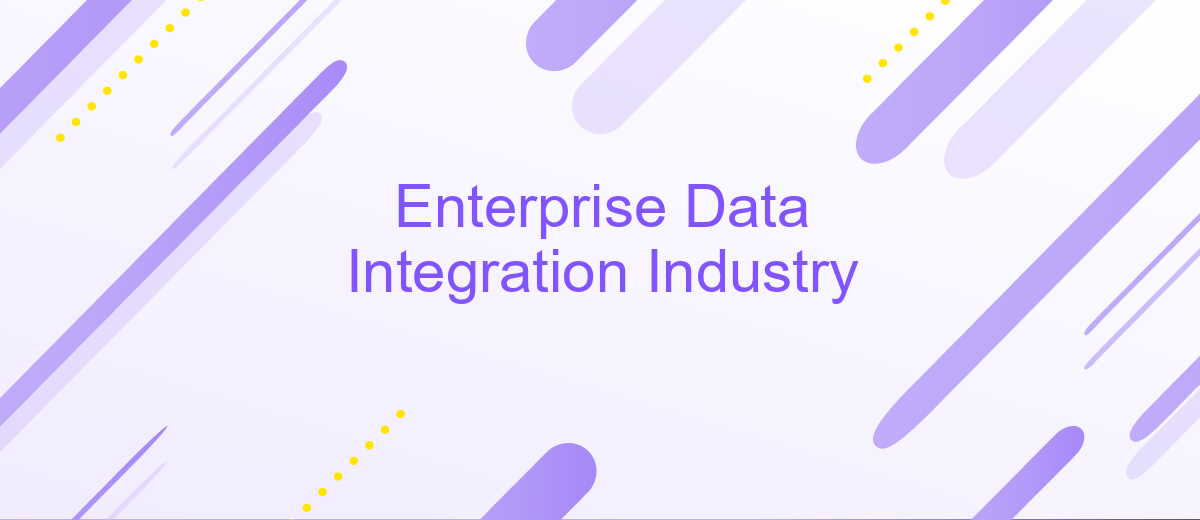Enterprise Data Integration Industry
The Enterprise Data Integration industry is experiencing rapid growth as organizations increasingly recognize the value of seamless data connectivity. By unifying disparate data sources, businesses can enhance decision-making, streamline operations, and drive innovation. This article explores the latest trends, technologies, and best practices that are shaping the future of data integration, offering insights into how companies can leverage these advancements for competitive advantage.
Market Overview
The Enterprise Data Integration (EDI) industry is experiencing significant growth, driven by the increasing need for seamless data management and real-time analytics. Organizations are increasingly adopting EDI solutions to integrate disparate data sources, streamline operations, and enhance decision-making processes. The demand for robust data integration tools is further fueled by the rise of big data, cloud computing, and the Internet of Things (IoT).
- Growing adoption of cloud-based solutions
- Increased focus on data governance and compliance
- Advancements in artificial intelligence and machine learning
- Expansion of IoT devices and sensors
- Rising need for real-time data processing and analytics
As businesses continue to digitize their operations, the EDI market is poised for substantial expansion. Vendors are investing in innovative technologies to offer scalable, secure, and efficient data integration solutions. This trend is expected to drive the market forward, providing organizations with the tools they need to harness the full potential of their data assets.
Key Trends

One of the key trends in the Enterprise Data Integration Industry is the growing adoption of cloud-based integration platforms. As businesses increasingly migrate their operations to the cloud, the demand for seamless data integration across various cloud services and on-premises systems has surged. This shift is driven by the need for agility, scalability, and cost-efficiency. Solutions like ApiX-Drive are gaining popularity as they offer user-friendly interfaces and robust functionalities to simplify the integration process, enabling organizations to connect disparate systems without extensive coding knowledge.
Another significant trend is the emphasis on real-time data integration and analytics. In today's fast-paced business environment, enterprises require immediate access to accurate and up-to-date information to make informed decisions. Real-time integration tools are becoming essential, allowing data to flow seamlessly between applications and systems as it is generated. This trend is further supported by advancements in machine learning and artificial intelligence, which enhance the ability to process and analyze large volumes of data in real time, providing actionable insights and driving smarter business strategies.
Vendor Landscape

The enterprise data integration industry is characterized by a diverse vendor landscape, offering a wide range of solutions to address the needs of businesses of all sizes. These vendors provide tools and platforms that facilitate the seamless integration of data from various sources, ensuring that organizations can leverage their data assets effectively. The competition among vendors drives innovation, resulting in advanced features and improved performance.
1. Large Enterprise Vendors: Companies like IBM, Oracle, and Microsoft offer comprehensive data integration solutions that cater to large enterprises with complex data environments.
2. Cloud-Based Vendors: Providers such as AWS, Google Cloud, and Azure specialize in cloud-native data integration services, enabling scalable and flexible solutions for businesses moving to the cloud.
3. Niche Vendors: Smaller, specialized vendors like Talend, Informatica, and MuleSoft focus on specific aspects of data integration, offering tailored solutions for particular industries or use cases.
This varied vendor landscape ensures that businesses have access to a wide array of options, allowing them to select the best-fit solution for their unique data integration needs. As the industry continues to evolve, we can expect further advancements and increased competition among vendors, ultimately benefiting end-users.
Challenges and Opportunities

The Enterprise Data Integration (EDI) industry faces significant challenges that can hinder its growth and efficiency. One of the primary challenges is the complexity of integrating diverse data sources, which often involve different formats, structures, and technologies. This complexity can lead to increased costs and extended timelines for integration projects.
Another major challenge is ensuring data quality and consistency across integrated systems. Inconsistent data can lead to inaccurate insights and poor decision-making, which can negatively impact business operations. Additionally, data security and privacy concerns are paramount, especially with the growing number of regulations and the increasing volume of sensitive data being processed.
- Complexity of integrating diverse data sources
- Ensuring data quality and consistency
- Data security and privacy concerns
- High costs and extended timelines
Despite these challenges, the EDI industry also presents numerous opportunities. Advances in technology, such as artificial intelligence and machine learning, offer innovative solutions to streamline data integration processes. Moreover, the growing demand for real-time data analytics and insights provides a fertile ground for EDI solutions to demonstrate their value, driving business growth and efficiency.
Future Outlook
The future of the Enterprise Data Integration industry looks promising as businesses increasingly recognize the importance of seamless data flow across various platforms. As companies continue to adopt cloud-based solutions and advanced analytics, the demand for robust data integration tools is expected to rise. Emerging technologies such as artificial intelligence and machine learning will play a crucial role in automating data integration processes, making them more efficient and less prone to errors. Additionally, the growing emphasis on data security and compliance will drive the development of more secure integration solutions.
One notable trend is the rise of integration-as-a-service platforms like ApiX-Drive, which simplify the process of connecting various applications and data sources. These platforms enable businesses to set up integrations quickly without the need for extensive coding or technical expertise. As more organizations seek to streamline their operations and improve data accessibility, services like ApiX-Drive will become increasingly valuable. Overall, the Enterprise Data Integration industry is poised for significant growth, driven by technological advancements and the ever-growing need for efficient data management solutions.
FAQ
What is Enterprise Data Integration?
Why is Enterprise Data Integration important for businesses?
How can businesses ensure the security of integrated data?
What are the common challenges in Enterprise Data Integration?
How can automation tools assist in Enterprise Data Integration?
Apix-Drive is a universal tool that will quickly streamline any workflow, freeing you from routine and possible financial losses. Try ApiX-Drive in action and see how useful it is for you personally. In the meantime, when you are setting up connections between systems, think about where you are investing your free time, because now you will have much more of it.

